Danshen Medication Safety Checker
This tool helps you understand the potential risks of combining Danshen with common heart medications. The information is based on peer-reviewed medical studies and clinical case reports.
Many people assume that if something is natural, it’s safe-especially when it comes to herbs. But Danshen is a dangerous exception. Used for centuries in traditional Chinese medicine to support heart health, this herbal root is now widely sold in health stores and online as a supplement. What most users don’t realize is that combining Danshen with common heart medications can lead to life-threatening bleeding. This isn’t theoretical. It’s documented in hospitals, emergency rooms, and peer-reviewed medical journals.
What Exactly Is Danshen?
Unlike pharmaceuticals, Danshen supplements aren’t standardized. One bottle might contain 0.05% tanshinone; another might have 5.2%. That’s over a 100-fold difference in potency. There’s no way to know what you’re actually taking. The Chinese Pharmacopoeia lists this variability as normal, but in the U.S., where supplements are barely regulated, that’s a recipe for disaster.
Why Danshen Is Dangerous with Blood Thinners
Danshen doesn’t just mildly affect blood clotting-it strongly inhibits platelet aggregation by up to 47% in lab tests. That’s comparable to low-dose aspirin. But here’s the catch: it also interferes with how your liver breaks down medications. Specifically, it blocks the CYP2C9 enzyme, the same one responsible for metabolizing warfarin. This means warfarin stays in your system longer, and your blood becomes dangerously thin.
Case reports from the Cleveland Clinic in 2001 showed three patients on stable warfarin therapy suddenly developing INR levels above 8.0 after starting Danshen. Normal INR for someone with a mechanical heart valve is 2.5-3.5. An INR above 8.0 means spontaneous bleeding is likely. One patient’s hemoglobin dropped to 7.6 g/dL-severe anemia from internal bleeding. Another needed emergency care after a minor fall led to a brain hemorrhage.
The risk isn’t limited to warfarin. Newer anticoagulants like rivaroxaban and apixaban are also affected. A 2022 NIH study found Danshen inhibits the metabolism of rivaroxaban, increasing its concentration in the blood. Unlike warfarin, which can be reversed with vitamin K or fresh plasma, there’s no antidote for Danshen’s effects. If you bleed, doctors can’t just give you a pill to fix it.
Real Cases, Real Consequences
A 2020 study in Taiwan tracked 17 patients over four years who took Danshen with warfarin. Their average INR jumped from 2.3 to 5.8. That’s not a small increase-it’s a 150% spike in bleeding risk. One patient had a gastrointestinal bleed requiring a blood transfusion. Another developed a subdural hematoma after a minor head bump.
Online forums like Reddit’s r/anticoagulants are full of similar stories: “My INR went from 2.5 to 6.0 after my TCM practitioner added Danshen with my Eliquis.” “ER visit after taking Danshen with warfarin-never again.” These aren’t anecdotes from uneducated users. These are people who trusted their herbalist, didn’t tell their cardiologist, and ended up in critical condition.
Even more troubling: a 2019 JAMA Internal Medicine survey found only 28% of people taking herbal supplements told their doctor. Many assume their doctor doesn’t care-or doesn’t know about herbs. But doctors need to know. Because when a patient comes in with unexplained bleeding, the first thing you check isn’t just their medication list-it’s their supplement list.
Who’s Most at Risk?
Chinese immigrants in the U.S. are especially vulnerable. A 2021 study found 41.7% regularly used Danshen while taking heart medications, yet only 32.4% discussed it with their physician. Cultural beliefs make this harder to address. Many see Danshen as “food medicine,” not a drug. But it’s not. It’s a potent pharmacological agent with documented interactions.
Older adults are another high-risk group. They’re more likely to be on multiple medications, have reduced liver function, and be less likely to question advice from traditional practitioners. A 66-year-old man with a history of atrial fibrillation might be told by a TCM clinic, “This herb will help your circulation,” without being warned it could cause a stroke from bleeding-or make his existing clot worse by thinning his blood too much.
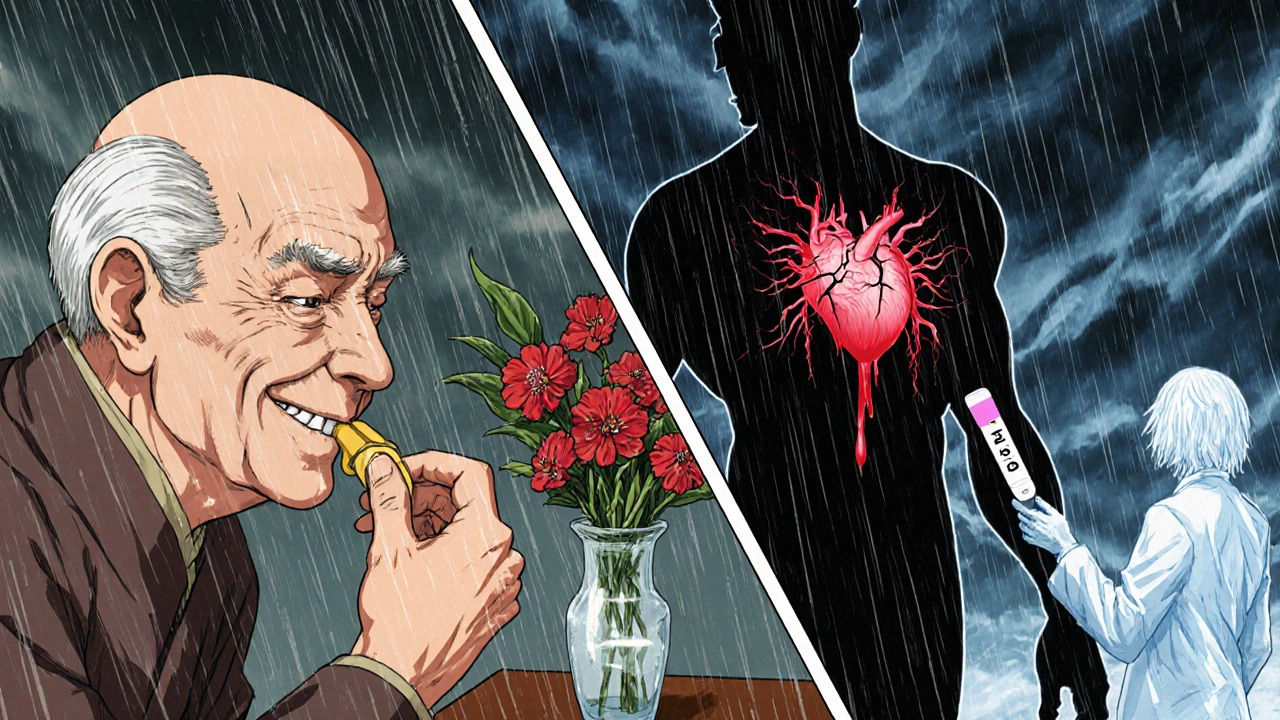
What About Other Heart Medications?
Danshen doesn’t just interact with anticoagulants. It can also lower blood pressure. When taken with beta-blockers, ACE inhibitors, or calcium channel blockers, it can push blood pressure too low, causing dizziness, fainting, or falls. In one documented case, a patient on lisinopril and Danshen developed severe hypotension requiring IV fluids.
It also affects how the body handles statins. While direct evidence is limited, Danshen’s inhibition of liver enzymes suggests it could increase statin levels, raising the risk of muscle damage (rhabdomyolysis). There’s no large-scale study yet, but the mechanism is clear-and that’s enough reason to avoid combining them.
What Should You Do?
If you’re on any heart medication-warfarin, rivaroxaban, apixaban, aspirin, clopidogrel, beta-blockers, or statins-do not take Danshen. Not even occasionally. Not even if your herbalist says it’s “safe.” The data doesn’t support it.
If you’re already taking Danshen, stop immediately and contact your doctor. Don’t wait for symptoms. Get an INR test if you’re on warfarin. If you’re on a newer anticoagulant, ask your provider about checking drug levels or watching for signs of bleeding: unusual bruising, nosebleeds, blood in urine or stool, headaches, or dizziness.
There’s no safe dose. No timing protocol. No monitoring strategy that makes this combination reliable. The American Heart Association and the National Center for Complementary and Integrative Health both warn: “Natural does not mean safe.”
What Are the Alternatives?
If you’re using Danshen for heart health, ask your doctor about evidence-based alternatives. For blood thinning, low-dose aspirin (if appropriate) is well-studied. For circulation support, regular aerobic exercise, omega-3 fatty acids (from fish oil), and controlling blood pressure and cholesterol have proven benefits without the risk.
Some people turn to Danshen because they distrust pharmaceuticals or want a “holistic” approach. But true holistic care means looking at the whole picture-including how everything you take interacts. Taking a supplement that could kill you isn’t holistic. It’s reckless.
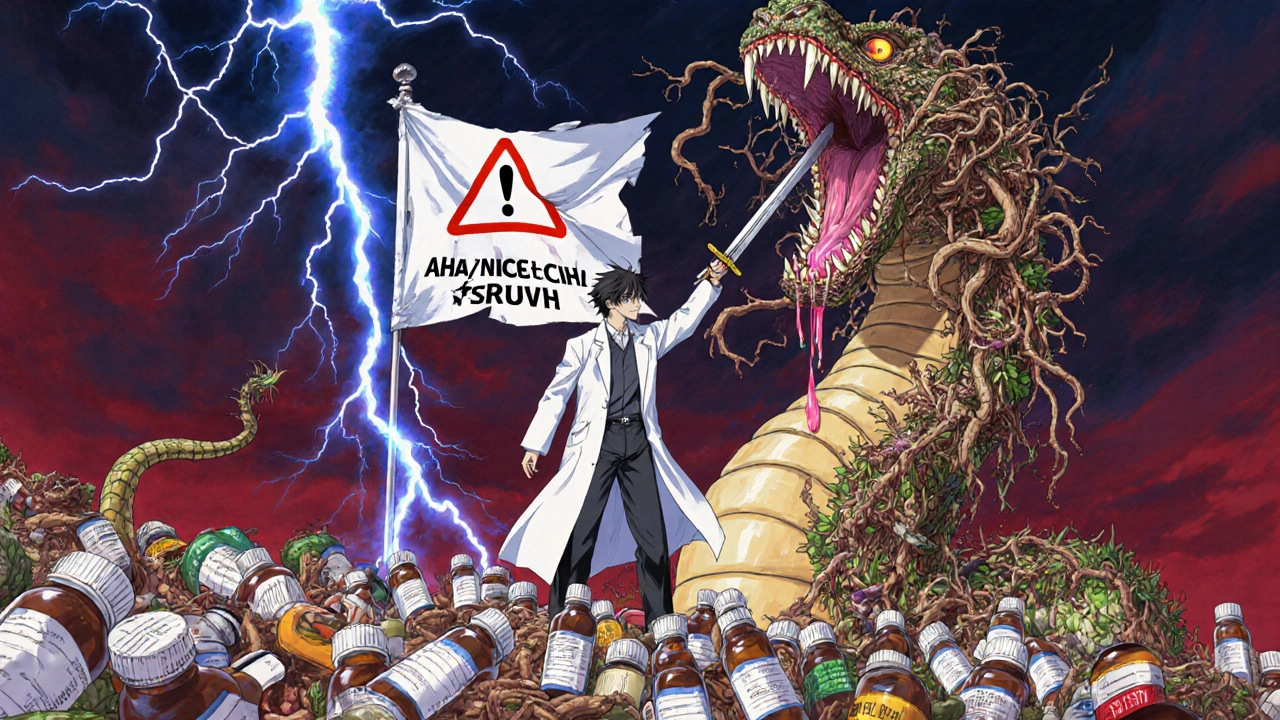
How to Talk to Your Doctor About Supplements
Most doctors don’t ask about herbs unless you bring it up. So bring it up. Say: “I’m taking Danshen for my heart. Is that safe with my meds?” Don’t say “I’m taking a natural remedy.” Say the name. Write it down. Show the bottle. If your doctor doesn’t know, ask them to check the Natural Medicines Database or contact a pharmacist specializing in herb-drug interactions.
The NCCIH has a standardized herbal supplement questionnaire doctors can use. Ask for it. Bring it to your next appointment. Make sure your supplement use is documented in your medical record.
Why This Problem Is Getting Worse
The global Danshen market is projected to hit $1.84 billion by 2027. More people are buying it. More online retailers are selling it. More influencers are promoting it as a “natural heart tonic.” Meanwhile, the number of people on anticoagulants is rising too-over 1.6 million Americans start a new blood thinner every year.
Regulation is lagging. The FDA has issued warnings about unapproved Danshen products, but they’re still sold legally as “dietary supplements.” The European Medicines Agency requires warning labels, but the U.S. doesn’t. China approves Danshen injections in hospitals, but those are administered under strict supervision. The supplements you buy online? Not even close.
Until that changes, the only protection you have is knowledge-and the courage to say no to something that sounds safe but isn’t.
Can I take Danshen if I’m not on blood thinners?
Even if you’re not on blood thinners, Danshen can still lower your blood pressure and affect liver enzymes. If you have heart disease, kidney issues, or are planning surgery, it could still be dangerous. There’s no proven benefit that outweighs the risk for most people. It’s safer to avoid it entirely unless under direct supervision by a doctor who knows exactly what’s in the product and how it interacts with your health.
Is there a safe form of Danshen?
No. Even standardized extracts used in clinical trials in China are only given in controlled hospital settings. The supplements sold in the U.S. vary wildly in potency and composition. There’s no certified safe version available over the counter. Any claim of a “safe” Danshen product is misleading.
How long does Danshen stay in your system?
There’s no definitive answer. Because Danshen contains multiple active compounds with different half-lives, and because individual metabolism varies, it’s impossible to predict how long it stays active in your body. For safety, assume it’s still affecting your blood for at least 7-10 days after your last dose-especially if you’re on anticoagulants.
What should I do if I accidentally took Danshen with my heart medication?
Stop taking Danshen immediately. If you’re on warfarin, get an INR test within 24-48 hours. Watch for signs of bleeding: unexplained bruising, nosebleeds, dark stools, or severe headaches. Call your doctor or go to the ER if you notice any of these. Don’t wait. The effects can be delayed but are often severe.
Why don’t supplement labels warn about these interactions?
In the U.S., supplement manufacturers aren’t required to prove safety or list drug interactions before selling their products. The FDA only acts after harm is reported. That’s why you’ll rarely see a warning on a Danshen bottle-even though the medical evidence is overwhelming. The burden falls on you to research the risks.
Final Thoughts
Danshen isn’t a harmless herb. It’s a powerful, unregulated drug with documented, life-threatening interactions. If you’re on heart medication, the choice is simple: take your prescribed treatment and avoid Danshen. No exceptions. No compromises. Your heart can’t afford the risk.

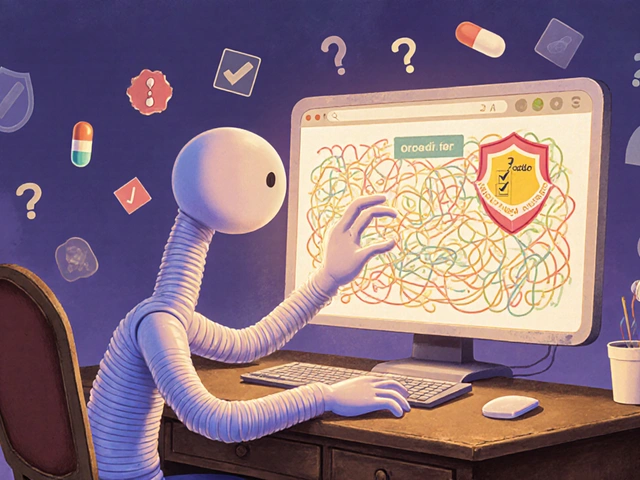
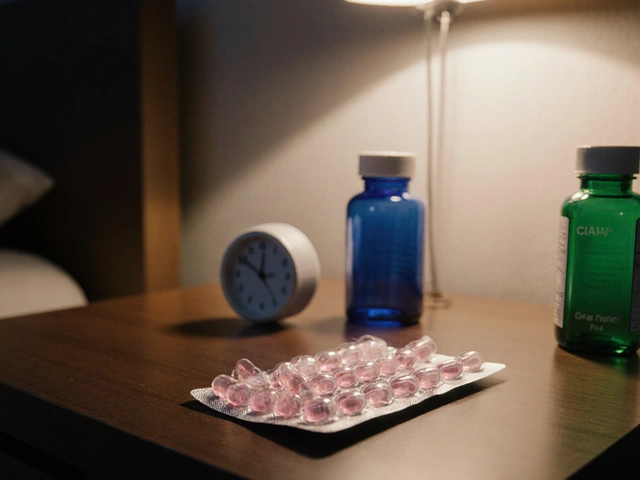
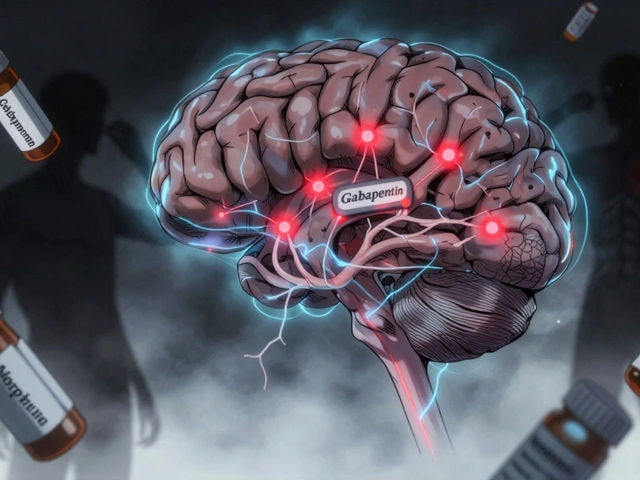


Mike Laska
This isn't just about Danshen-it's about the entire wild west of supplement regulation. I had a neighbor take 'natural heart support' pills after his stent and ended up in the ER with a GI bleed. No one asked him what he was popping. No one checked. The FDA acts like they're babysitting toddlers with candy jars while people are literally bleeding out from unlabeled botanicals.
Hazel Wolstenholme
How delightfully quaint that we still cling to the myth of 'natural = safe' as if nature hasn't evolved arsenic, botulinum, and hemlock. Danshen is not a tea-it's a pharmacologically active compound with a half-life and metabolic pathways as precise as any pharmaceutical. The fact that it's sold without batch standardization is less a regulatory failure and more a testament to our collective surrender to pseudoscientific nostalgia. The Han Dynasty didn't have CYP450 enzyme assays, and neither should we pretend their remedies are immune to modern pharmacokinetics.
Andy Ruff
People like you who take supplements like they're M&Ms are the reason hospitals are overflowing. You think you're being 'holistic'? You're being reckless. You don't get to play doctor because you read a blog post by some 'herbalist' who sells $40 jars of powdered root. Your 'natural remedy' is a chemical grenade tossed into your own cardiovascular system. And don't even get me started on the fact that you didn't tell your cardiologist-because you knew they'd tell you to stop. That's not holistic. That's suicide with a side of virtue signaling.
Eileen Choudhury
I come from a family that’s used Danshen for generations-my grandmother swore by it for her circulation. But after reading this, I’m taking it to my doctor next week. Maybe it’s not the herb itself, but how we use it? I don’t want to lose my parents to something we thought was helping. Let’s not throw the baby out with the bathwater, but let’s also stop pretending ignorance is wisdom. 💚
Pradeep Kumar
As someone from India where ayurveda is deeply rooted, I get it. We all want something gentle, something ancient. But this isn't just about tradition-it's about science meeting culture. My uncle took ashwagandha with blood pressure meds and nearly passed out. We didn't know. Now we ask. Always ask. The heart doesn't care if it's herbal or synthetic-it only cares if it's safe. 🙏
Melissa Kummer
Thank you for this meticulously researched and urgently necessary piece. The absence of mandatory labeling on dietary supplements is not merely a legislative gap-it is a public health emergency. I have shared this with my entire family, including my elderly parents who are on warfarin. The phrase 'natural does not mean safe' should be etched into every supplement bottle, every pharmacy shelf, every wellness influencer’s bio. Knowledge is not optional-it is survival.
andrea navio quiros
supplements are a symptom of a broken system where trust in pharma is low and trust in tradition is high but neither side has the full picture the body doesn't care about your beliefs it only reacts to chemistry and if you're taking something that alters your coagulation you owe it to yourself to know what's in it and what it does
Alexa Apeli
Thank you for shining a light on this critical issue 🌟 I’m so grateful for your courage in speaking up. I’ve seen too many loved ones fall into the trap of 'natural = harmless.' Let’s turn this into a movement-not just awareness, but action. Ask your doctor. Document your supplements. Share this with someone you love. We can save lives by choosing knowledge over convenience. 💖
Zachary Sargent
Just stopped taking my Danshen after reading this. No drama. No fanfare. Just... stopped. My INR was creeping up. I didn't need a 15-page essay to know I was playing Russian roulette with my blood. Thanks for the wake-up call.